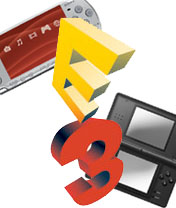Opinion: Handheld gaming unfairly eclipsed by newer consoles
The industry assumes big is better, when increasingly this isn't always the case

E3 would like you to know that rumours of its death have been greatly exaggerated. Quite the contrary, this year's show was a surprise in its relatively successful execution. It was a week of cheesy press conferences, back-to-back appointments, and a mountain of new games – a lot of which we previewed hands on.
The presence of handheld games was somewhat different this year, however, a change that likely reflected the show's new format. As an indicator of where handhelds exist in the gaming space and where they're headed in the course of the coming year, E3 was an interesting mix of good, bad, and a little bit of in-between.
There's no debating the emphasis was placed on the big consoles during the event. Handheld games weren't forgotten, but were certainly relegated to the second row. High profile titles such as The Legend of Zelda: Phantom Hourglass, WipEout Pulse and Contra 4 received a fair bit of attention, yet it certainly wasn't nearly the amount lavished on triple-A console games like Killzone 2, Halo 3, and Super Mario Galaxy.
The irony, of course, is that some of the handheld games on display will likely surpass sales of the majority console titles this year. Nintendo has already shipped a half million copies of The Legend of Zelda: Phantom Hourglass in Japan, for example, with a likely million to be sold in North America and Europe. This number will surely eclipse sales of a great majority of PlayStation 3, Xbox 360, and Wii games. (If you require further convincing, just note how the only title released on PlayStation platforms to win Platinum status at the recent PlayStation Awards 2007 for selling over a million copies over the 2006 fiscal year was Monster Hunter Portable 2 on PSP.)
Why wasn't more attention paid to PlayStation Portable and Nintendo DS games? After all, millions of these handhelds reside in the pockets of gamers worldwide, far more than the number of latest generation consoles sitting in homes worldwide.
Much of it comes down to publisher's desire to promote console games in order to boost sales in a smaller market. Getting people to pick up a copy of WipEout Pulse for PSP is far easier than convincing them to drop money on an unproven PlayStation 3 sequel or quirky title on Wii – especially when that might entail effectively selling the console, too. Publishers don't need to push handheld titles nearly as much because many of the games sell themselves.
Nevertheless, it's true that a continuing attitude of inferiority exists towards handheld gaming, but that's largely disappearing. The sheer number of individuals carrying around a Nintendo DS or PSP forces respect for handheld games.
This is also somewhat evident in the fact most publishers had a portable title or two to show during E3. Interestingly, though, not all publishers were entirely eager to show off their handheld wares over their console games. For instance, in a private appointment with Ubisoft we were asked to take a look at the Wii version of Rayman Raving Rabbids 2. Had we not noticed the Nintendo DS version tucked away on a nearby table, we wouldn't have ever known it existed. (Once pointed out, Ubisoft gladly demonstrated the DS iteration, even giving us a hands on go.)
Anecdotal, true, but it's a situation that highlights the position in which many publishers put handheld games. Another is the widespread shortage, at least in Europe, of games for preview and review. The publishers simply don't supply enough games to go around the media (in fact, they sometimes supply their PRs with none).
We assumed this situation would ease as Pocket Gamer has grown since launch last year, but colleagues at more established and in some cases fairly massive sites report similar problems. By contrast, getting press copies of console games is a doddle.
Of course, the recent news coming from Sony regarding PlayStation Portable could help priorities shift again. The PSP redesign took the spotlight at E3 and it raised a lot of talk. ("Sony's pretty serious about pushing that little thing," said one insider.) As we see it, it's suddenly pushing harder with new hardware and a load of promising games.
Sony had much of its line-up playable, while Nintendo left attendees to fend for themselves. Aside from The Legend of Zelda: Phantom Hourglass and Brain Age 2, the company just wasn't showing much for its platform on the show floor. Perhaps it was a move to shift focus to third-party games – or maybe Nintendo is resting a bit on its laurels.
Regardless of the reasons, it would have been nice to see more of an effort to promote handheld games. With E3 2008 sure to undergo a number of organizational changes, we're hoping the resulting format will mean a better stage on which to showcase portable gameplay. We're thinking sofas would be a start. Or they could go the whole hog and get a few buses, train carriages and commercial jets in for attendees to sit and play new games in, to really recreate that handheld games vibe.
